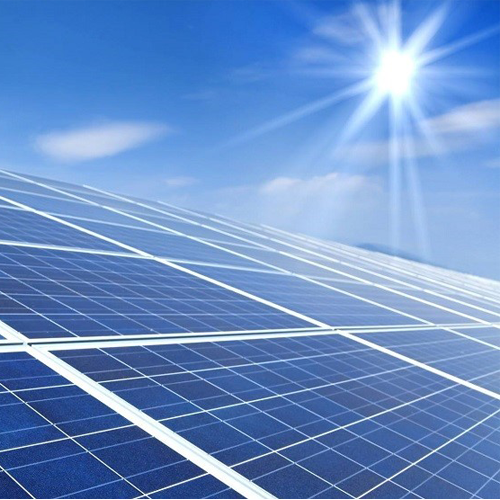- Large Appliances
- Small Appliances
- Home Security Tools
- Kitchen Appliances
- Food Processors
- Blenders & Hand Blenders
- Mixers
- Dough Mixer
- Choppers & Slicers
- Meat & Spice Grinders
- Deep Fryers
- Air Fryers
- Grills
- Toasters
- Rice Cookers, Thermo Cookers & Soup Makers
- Food Steamers
- Omlette Maker
- Coffee & Espresso
- Electric Kettles
- Juice Extractors
- Juice Presses
- Ice Cream Makers
- Popcorn Maker
- Crepe Maker
- Specialty Appliances
- Water Purifiers
- Kitchen Tools and Utensils
- Home Decoration & Organization
Solar Energy

Did you know that the energy sun provides to the earth for one hour could meet the global energy needs for one year? Undoubtedly, the sun is a powerful energy source, and even though we are not able but to collect a fraction of this energy, yet harnessing this power by installing solar panels can make a significant difference to the planet.
While it has been widely criticized for being expensive or inefficient, solar energy has now proved to be extremely beneficial – not only for the environment but also for the private economy.
Thanks to available solar panel grants, as well as, the increasingly competitive prices in the market, solar energy has become the main source of energy for more and more families. The technology has been drastically improved the last years and has been complemented by solar battery storage systems, turning solar into a significantly more efficient source of clean energy.
However, there are always downsides no matter the energy source you choose to analyze. The key advantages and disadvantages of solar power are outlined in the following points:
Advantages of Solar Energy
1. Renewable Energy Source
Among all the benefits of solar panels, the most important thing is that solar energy is a truly renewable energy source. It can be harnessed in all areas of the world and is available every day. We cannot run out of solar energy, unlike some of the other sources of energy.
Solar energy will be accessible as long as we have the sun, therefore sunlight will be available to us for at least 5 billion years when according to scientists the sun is going to die.
2. Reduces Electricity Bills
Since you will be meeting some of your energy needs with the electricity your solar system has generated, your energy bills will drop. How much you save on your bill will be dependent on the size of the solar system and your electricity or heat usage.
For example, if you are a business using commercial solar panels this switch can have huge benefits because the large system size can cover large chunks of your energy bills.
3. Diverse Applications
Solar energy can be used for diverse purposes. You can generate electricity (photovoltaics) or heat (solar thermal). Solar energy can be used to produce electricity in areas without access to the energy grid, to distil water in regions with limited clean water supplies and to power satellites in space.
Solar energy can also be integrated into the materials used for buildings. Not long ago Sharp introduced transparent solar energy windows.
4. Low Maintenance Costs
Solar energy systems generally don’t require a lot of maintenance. You only need to keep them relatively clean, so cleaning them a couple of times per year will do the job. If in doubt, you can always rely on specialized cleaning companies, which offer this service.
Most reliable solar panel manufacturers offer 20-25 years warranty.
Also, as there are no moving parts, there is no wear and tear. The inverter is usually the only part that needs to be changed after 5-10 years because it is continuously working to convert solar energy into electricity and heat (solar PV vs. solar thermal). Apart from the inverter, the cables also need maintenance to ensure your solar power system runs at maximum efficiency.
So, after covering the initial cost of the solar system, you can expect very little spending on maintenance and repair work.
5. Technology Development
Technology is the solar power industry is constantly advancing and improvements will intensify in the future. Innovations in quantum physics and nanotechnology can potentially increase the effectiveness of solar panels and double, or even triple, the electrical input of the solar power systems.
Disadvantages of Solar Energy
1. Cost
The initial cost of purchasing a solar system is fairly high. This includes paying for solar panels, inverter, batteries, wiring, and the installation. Nevertheless, solar technologies are constantly developing, so it is safe to assume that prices will go down in the future.
2. Weather-Dependent
Although solar energy can still be collected during cloudy and rainy days, the efficiency of the solar system drops. Solar panels are dependent on sunlight to effectively gather solar energy. Therefore, a few cloudy, rainy days can have a noticeable effect on the energy system. You should also take into account that solar energy cannot be collected during the night.
On the other hand, if you also require your water heating solution to work at night or during wintertime, thermodynamic panels are an alternative to consider.
Make the Transition to Solar Energy Today!
There are pros and cons to solar energy, but pros are much more than cons.
Has this sparked your interest in solar energy? We can help you find your best deal! Simply contact us and we will get back to you with up to 4 quotes from our professional installers.






















